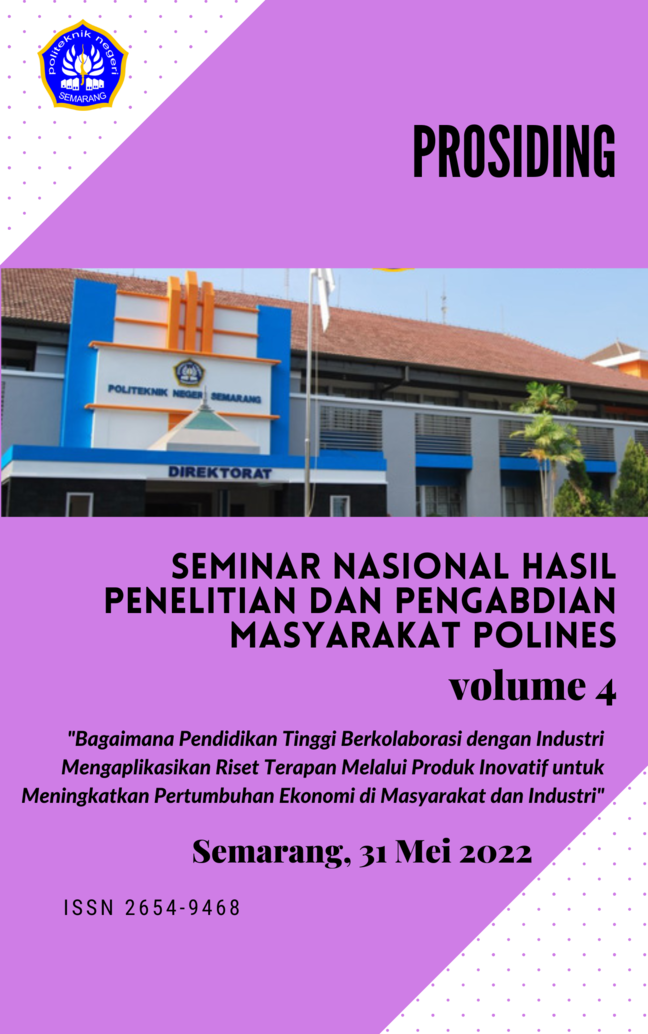PENERAPAN, HAMBATAN, DAN KEUNGGULAN PEMBELAJARAN DARING TERHADAP PERILAKU BELAJAR MAHASISWA JURUSAN ADMINISTRASI BISNIS POLITEKNIK NEGERI SEMARANG
Keywords:
online learning, student learning-behaviourAbstract
Online learning has become the main tool in the teaching and learning process during the Covid-19 pandemic, including for the entire academic community at the Department of Business Administration, Semarang State Polytechnic (Polines), where during online learning is required to use the Learning Management System (LMS) media, owned by Polines named Elnino, and is also equipped with several other supporting online applications that are tailored to the needs and comfort during the teaching and learning process, such as Zoom Meetings, Google Meet, Whatsapp groups, Google Classroom rooms, and others. While the learning method using video conferencing and one-way learning by providing materials and assignments to students are the most frequently used methods.
This research uses an online survey method via google form to students in the Polines Business Administration Department who have implemented online learning in all existing study programs. The results obtained are that the application of online learning and the advantages of online learning have a partial effect on student learning behavior, while online learning barriers have no effect. Most of the respondents stated that the advantages of online learning are that it is flexible, and able to improve students' digital abilities, while the obstacles to learning are more limited quotas, internet connections, and learning which is sometimes felt to be less varied.References
Aan, W. (2020). Efektifitas Perkuliahan Daring (Online) pada Mahasiswa PGSD di Saat Pandemi Covid 19. Jurnal Pendidikan, Vol. 8, No. 2, Tahun 2020 ISSN: 2337- 7607 e-ISSN: 2337-7593
Chan, N. N., Walker, C., & Gleaves, A. (2015). An exploration of students”™ lived experiences of using smartphones in diverse learning contexts using a hermeneutic phenomenological approach. Computers and Education. https://doi.org/10.1016Zj.compedu.2014.1
Darmalaksana, W. (2020). WhatsApp Kuliah Mobile . Fakultas Ushuluddin UIN Sunan Gunung Djati Bandung.
Elyas, H. A. (2018). Penggunaan model pembelajaran e learning dalam meningkatkan kualitas pembelajaran. Jurnal Warta. Vol. 56 (1829-7463)
Firman, F., & Rahayu, S. (2020). Pembelajaran Online di Tengah Pandemi Covid-19. Indonesian Journal of Educational Science (IJES), 2(2), 81-89
Fuadi, T. M., Musriandi. R., &Suryani, L., (2020). Covid-19 : Penerapan Pembelajaran Daring Di Perguruan Tinggi. Jurnal Dedikasi Pendidikan, 4(2), 193”“200.
Ghozali, I., & Latan, H. (2015). Partial Least Squares: konsep, teknik dan aplikasi menggunakan program SmartPLS 3.0 (2nd ed.). Semarang: Badan Penerbit Universitas Dipenogoro Semarang.
Hasanah, A., Lestari, A. S., Rahman, A. Y., & Daniel, Y. I. (2020). Analisis aktivitas belajar daring mahasiswa pada pandemi Covid-19. http://digilib.uinsgd.ac.id/id/eprint/30565
Hikmat., Hermawan, Endang., Aldim., Irwandi. (2020). Efektivitas Pembalajaran Daring Selama Masa Pandemi Covid-19: Sebuah Survey Online. UIN Sunan Gunung Djati Bandung.http://digilib.uinsgd.ac.id/id/epri nt/30625
Hussein, Ananda Sabil. 2015. Penelitian Bisnis Dan Manajemen Menggunakan Partial Least Squares (PLS) Dengan SmartPLS 3.0. Modul Ajar, 1”“29.
Ikhwan, A. N. (2020). Penggunaan Software dalam pembelajaran kampus di masa Pandemi Covid 19: studi literature. Jurnal Pendidikan
Jamil, Aprilisanda (2020). Pengaruh Pembelajaran Daring terhadap Minat Belajar Mahasiswa pada Masa Pandemi Covid-19. Behavioral Accounting Journal. Vol. 3, No. 1, Juni 2020.
Joesyiana. (2020). The Effectiveness Of Online Classes During The Covid-19 Pandemic (Case Study : Students Of The Management Study Program Of Persada Bunda). Open Journal System Vol.15 No.2 September 2020.
Khan, B. (2005). Managing e-learning strategies: Design, delivery, implementation, and evaluasi. USA: Ideal Group, Inc.
Kumar, V., & Nanda, P. (2018). Social Media in Higher Education. International Journal of Information and Communication Technology Education. https://doi.org/10.4018/ijicte.2019010107
Lau, W. W. F. (2017). Effects of social media usage and social media multitasking on the academic performance of university students. Computers in Human Behavior. https://doi.org/10.1016/j.chb.2016.11.043
Matteo, L. (2020). The Coming Coronavirus Crisis: What Can We Learn?. Journal Spinger. Vol. 55 (98-104)
Maudiarti, S. (2018). Penerapan e- learning di perguruan tinggi. Jurnal Perspektif Ilmu Pendidikan. Vol 32 (1).
Maulana, H. A., & Hamidi, M. (2020). Persepsi Mahasiswa terhadap Pembelajaran Daring pada Mata Kuliah Praktik di Pendidikan Vokasi. Equilibrium: Jurnal Pendidikan, 8(2), 224- 231. https://doi.org/10.26618/equilibrium.v8i2. 3443
Santoso. E. (2009). Pengaruh pembelajaran online terhadap prestasi belajar kimi ditinjau dari kemampuan awal siswa. Tesis. Universitas Sebelas Maret Surakarta.
Sijabat, Sianipar, & Siahaan. (2020). Pengaruh Pembelajaran Daring Terhadap Minat Belajar Mahasiswa Pendidikan Fisika Uhkbpnp Pada Matakuliah Fisika Umum. The 2st National Conference on Education, Social Science, and Humaniora.
Syarifudin, A. S. (2020). Impelementasi Pembelajaran Daring Untuk Meningkatkan Mutu Pendidikan Sebagai Dampak Diterapkannya Social Distancing. Jurnal Pendidikan Bahasa dan Sastra Indonesia Metalingua, 5(1), 31-34. https://doi.org
Yunianto. A. R. (2015). Implementasi e learning berbasis kelase sebagai sumber belajar. Skripsi. Universitas Negeri Semarang
Yunitasari, Hanifah (2020). Pengaruh Pembelajaran Daring terhadap Minat Belajar Siswa pada Masa COVID 19. Edu Sains Jurnal Pendidikan Sains & Matematika 2(3):232-243
Undang-Undang No. 20 Tahun 2003 tentang Sistem Pendidikan Nasional
Surat Edaran Kementrian Pendidikan dan Kebudayaan No. 1 Tahun 2020






